The 7 Greatest Comp Climbing Rivalries of All Time
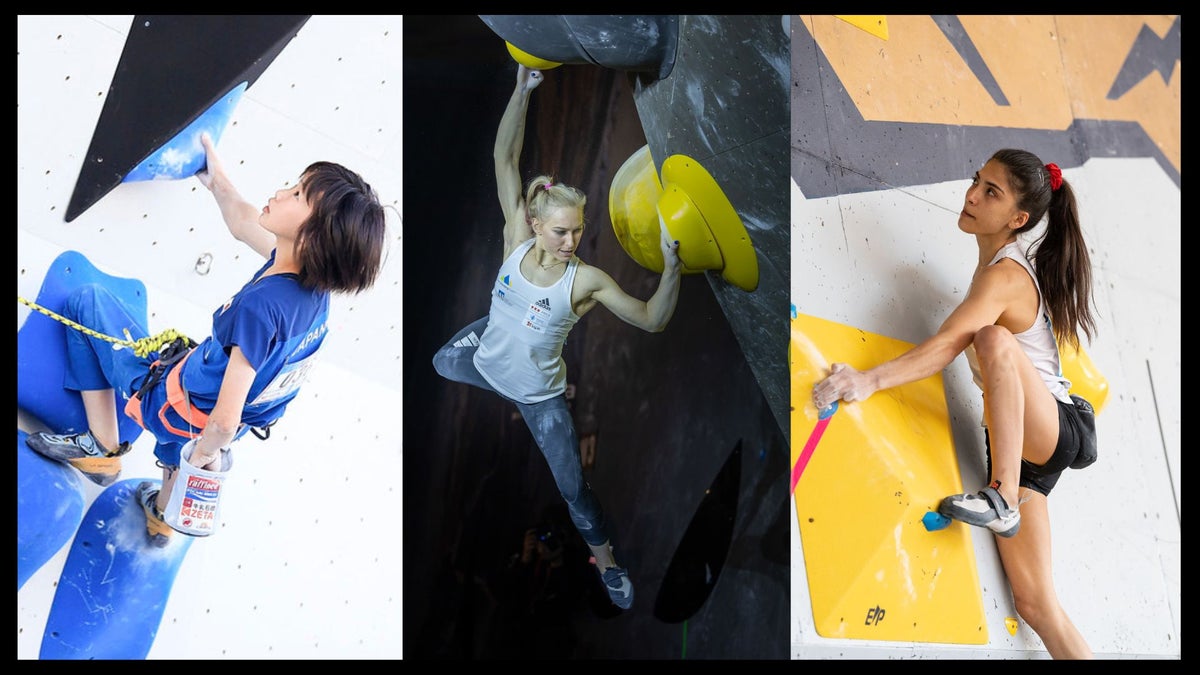
As the 2024 World Cup season clips along, and the Paris Olympics loom as the most anticipated climbing showcase of the past several years, I thought it was a good time to look back at some of the most thrilling rivalries in the history of competition climbing—some of which are still active and will be played out in the Paris Olympics.
The savvy comp historians among you may note that many all-time great comp climbers (François Legrand, Sandrine Levet, Akiyo Noguchi, Anna Stöhr, etc.) managed to have acclaimed careers without being embroiled in any multi-season feud with a singular, frequent foe. But for the competitors on this admittedly subjective list, certain climbing rivalries proved to be just as career-defining as any accolades earned on the wall.
7. Robyn Erbesfield vs. Isabelle Patissier
Many competitors deserve credit for first giving climbing’s World Cup circuit an American presence—Jim Karn, Lynn Hill, and Todd Skinner among them. But no American was more influential in the earliest days of the World Cup circuit than Robyn Erbesfield.
Erbesfield won the first-ever World Cup, a highly touted event that took place in Leeds, England, in 1989. Six years later, she became the first American to win a World Championship. Between those landmark achievements, she repeatedly battled a host of crushers, including USA’s Lynn Hill, France’s Nanette Raybaud and Isabelle Patissier, and Switzerland’s Susi Good. One could argue that any of those competitors served as Erbesfield’s main adversary, but—in my opinion—Patissier was the standout foil to Erbesfield’s greatness. After all, she was the runner-up at that first-ever World Cup, in 1989. And at the following World Cup, in La Riba, Spain, it was Patissier, not Erbesfield, who won the gold.
View this post on Instagram
The Erbesfield-Patissier rivalry hit a fever-pitch in the 1991 and 1992 seasons. By the numbers, Patissier earned more gold medals in that two-year span (four golds, compared to Erbesfield’s three). But during one stretch, Erbesfield earned a spot on the podium at nine consecutive events—beating Patissier on multiple occasions along the way. The duo remained perpetually embroiled in World Cup battles until Patissier retired from World Cups at the conclusion of the 1994 season. And even with all their close encounters on the wall, there was always deep-seeded, mutual respect. “Robyn stayed at my flat in Aix-en-Provence [in southern France] for some time, and it was nice to train with her,” Patissier recalled. “She was a great and strong competitor, but the friendly relationship with her was perfect.”
Erbesfield—now Erbesfield-Raboutou—is still closely connected to elite climbing. She founded the famous Team ABC, out of Boulder, Colorado, which has three athletes on the U.S. Combined Boulder & Lead Olympic Team. One of those athletes, Brooke Raboutou, is her daughter.
6. Kiromal Katibin vs. Veddriq Leonardo
Speed climbing has had its fair share of rivalries over the years. But one present-day coupling stands above all the others—that of Indonesian teammates Kiromal Katibin and Veddriq Leonardo. The world first learned of this rivalry when Katibin and Leonardo each broke the world record at a World Cup in Salt Lake City in 2021—a record that had stood for five years. (Katibin broke it first, clocking a time of 5.25 seconds in the qualification round, but this was immediately followed by Leonardo’s record-setting time of 5.20 seconds in the finals.)
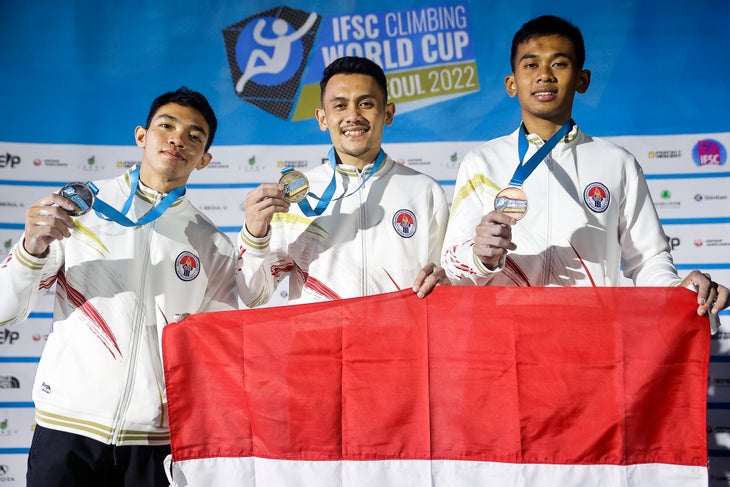
The real excitement came the following year, when the two competitors went back-and-forth in race results, breaking and setting a new world record five times throughout the course of the 2022 World Cup season. Katibin clocked a record time of 5.00 seconds in early July 2022, which stood as the world record for nearly a year. Leonardo eventually notched a race time of 4.90 seconds at a World Cup in Seoul last year, which also stood as a men’s world record for a while.
It’s probable that the discipline of speed climbing will never again see the men’s world record change so often or significantly in such a short window of time; it’s also likely that no pair of compatriots will rule the scene in the way that Katibin and Leonardo have in recent years.
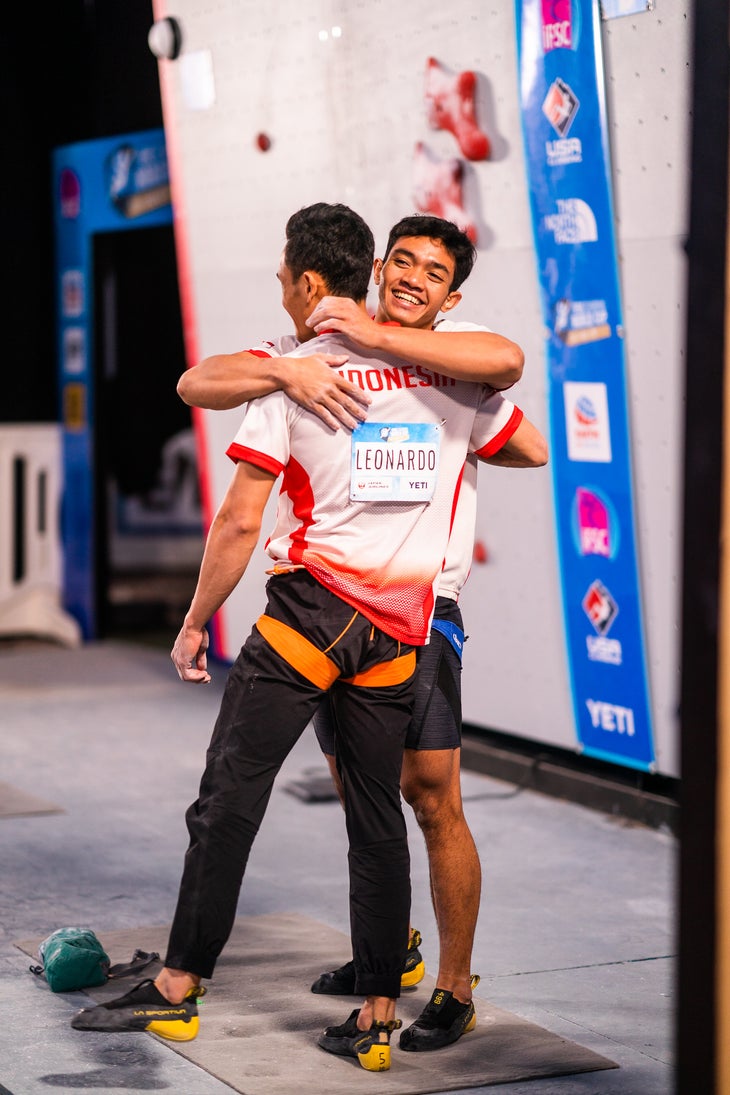
Only Leonardo will be on the roster for the Paris Olympics—as he narrowly beat Katibin for the last remaining Indonesian Olympic berth at the recent Olympic Qualifier Series. However, with Leonardo being 27 years old and Katibin being 23, each should still be considered well within his performative prime, thus ensuring many more close races between the two compatriot rivals for years to come.
5. Bobbi Bensman vs. Alison Osius
Although the classic duel between Americans Bobbi Bensman and Alison Osius never got to play out at World Cup level, there was a window of time in the early 1990s when it was the defining comp climbing rivalry. Some of the earliest meetings between Bensman and Osius took place at the Rockmasters, a short-lived American circuit of competitions run by climber-turned-organizer Jeff Lowe in Berkeley and Seattle in 1990, where Benson and Osius traded wins. An even greater stage for battle was the famous Snowbird competition, which took place over the July 4th weekend in 1990. In a thrilling culmination of the event, both Bensman and Osius topped the final round, necessitating a superfinal round—in which Bensman ultimately claimed a narrow victory.
Bensman and Osius continued neck-and-neck in competitions in the following year, culminating in the U.S. National Championships in 1991, where Bensman won gold and Osius earned silver. But the rivalry slowed down over time. While both climbers continued to compete throughout the 1990s, the competitive magic climaxed in 1990 and 1991.
Fun fact: Osius went on to become a climbing journalist. She was a senior editor at Rock and Ice, then at Climbing, before stepping into a senior editor role at Climbing’s sibling brand, Outside.
4. Janja Garnbret vs. Ai Mori
One of the most fascinating facts about the lead climbing rivalry between Slovenia’s Janja Garnbret and Japan’s Ai Mori is that it emerged at the tail-end of a season, which meant that few fans or pundits saw it coming. Janja Garnbret had ruled all the lead World Cups of 2022—winning in Innsbruck, Villars, Chamonix, and Briançon—and it seemed almost a foregone conclusion that Garnbret would continue winning in the lead discipline and sweep the 2022 season.
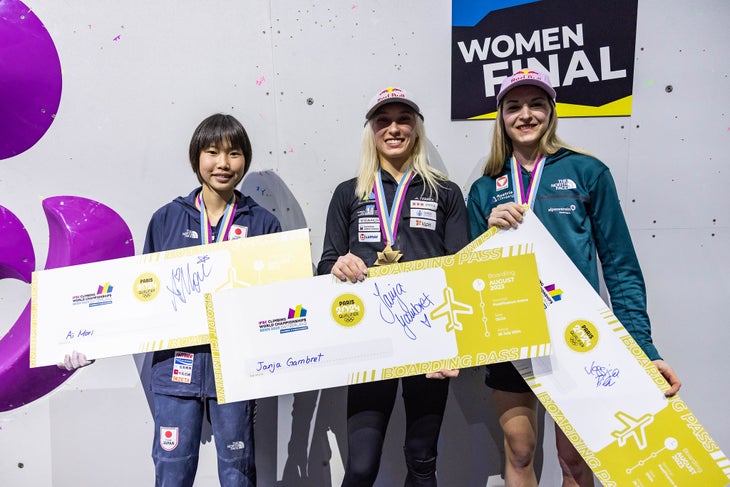
But then Ai Mori swooped onto the circuit (having taken three years away from it) and beat Garnbret at a World Cup in Slovenia. As if to prove that win was not a fluke, Mori beat Garnbret the following weekend at a lead World Cup in Scotland. Mori then left the World Cup circuit as quickly as she had emerged on it; Garnbret won the final lead World Cup of 2022, and everyone was left scratching their heads and wondering what the heck just happened.
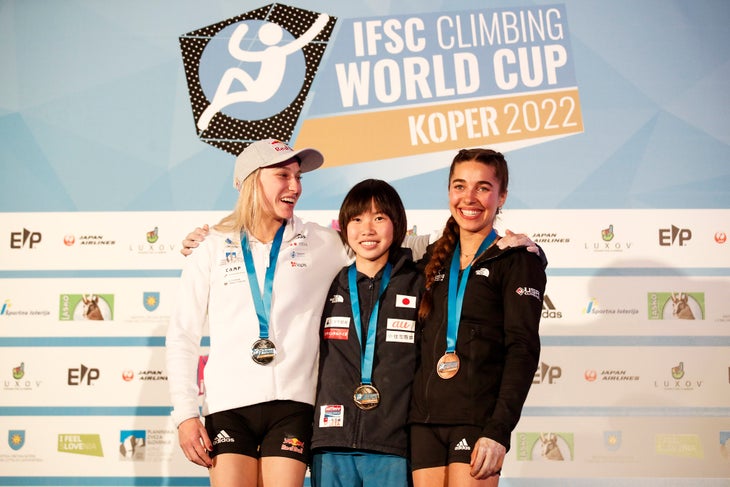
Mori’s brief and wondrous appearances on the World Cup circuit became some of the biggest stories of 2022 and instantly established Mori as a marquee adversary for Garnbret. The rivalry intensified the following year, when Garnbret kicked off the lead season by beating Mori—a victory that was framed as Garnbret’s “revenge” for the previous season’s losses. But Mori bounced back in a big way, beating Garnbret in the lead discipline at the World Championships later in the year.
Garnbret and Mori are both qualified for the 2024 Olympics, so it’s likely that another chapter will soon be added to their storied rivalry.
3. Janja Garnbret vs. Natalia Grossman
If Ai Mori proved to be a great foil to Janja Garnbret on the lead wall, it was Team USA’s Natalia Grossman who played that key role on the boulders. A rivalry between Natalia Grossman and Janja Garnbret began when Grossman narrowly beat Garnbret at a World Cup in Salt Lake City in 2021. Janja Garnbret was already a megastar at the time, and she was still riding the wave of an undefeated 2019 boulder World Cup season. But the rivalry continued in an unpredictable way: As the 2021 World Cup season wound down, Garnbret suffered a knee injury and missed the 2021 World Championships. In Garnbret’s absence, Natalia Grossman put on a masterclass, winning the boulder discipline by emphatically topping all four finals’ blocs.
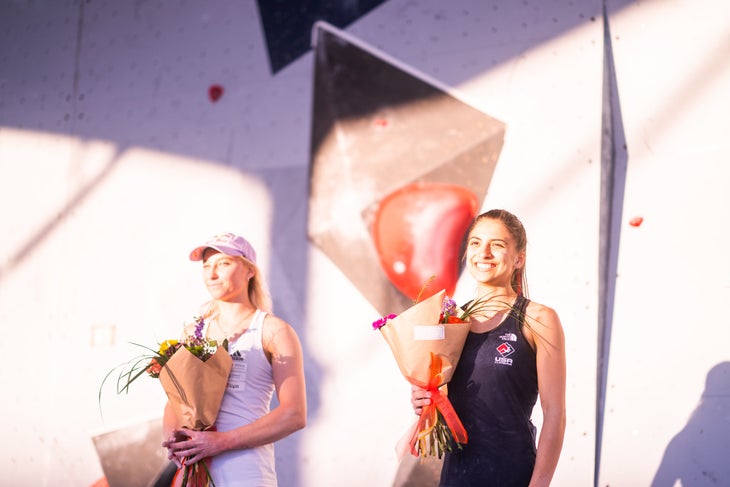
Janja Garnbret remained out of commission for most of the 2022 boulder season, leaving Grossman to secure a whopping five consecutive World Cup victories. It created a unique phenomenon: Garnbret and Grossman were widely thought to be the best competition boulderers on the planet, but they rarely went head-to-head against each other at competitions.
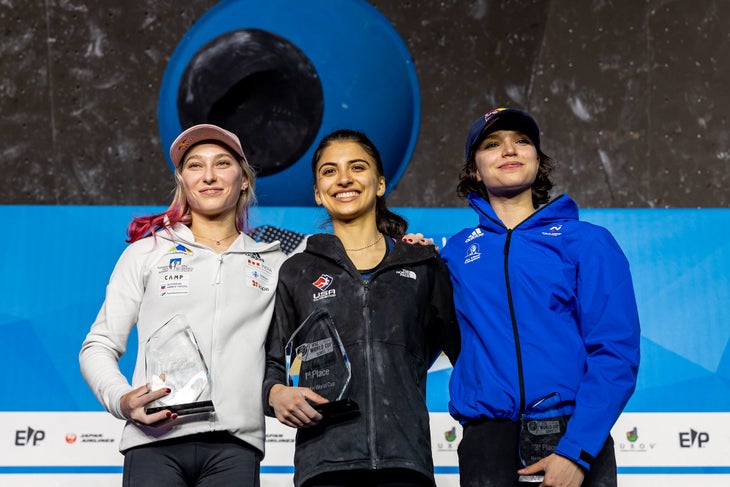
Garnbret eventually returned to the World Cup circuit, and both Garnbret and Grossman each had instances of superiority during the 2023 boulder season. For instance, Grossman claimed World Cup gold early in the season, in Salt Lake City and Brixen, and Garnbret won a World Cup in Innsbruck near the end of the boulder season. Their rivalry still feels white-hot, and although Sport Climbing in the Paris Olympics will feature a combined (boulder and lead) discipline, don’t be surprised if Garnbret and Grossman steal the bouldering show.
2. Liv Sansoz vs. Muriel Sarkany
The mid-1990s are remembered in comp climbing circles largely for popularity of the X Games, but there was noteworthy stuff happening on the World Cup circuit too—and nothing was more thrilling than the multi-season battle between Liv Sansoz and Muriel Sarkany. The two competitors seemed like stark contrasts: Sarkany was from Belgium and was first and foremost a comp climber; Sansoz, four years younger, hailed from France and was noteworthy for landmark ascents outdoors. (In 2000, she became the second woman to ever climb a route graded 5.14c). But in 1996, Sansoz and Sarkany were inexorably linked as they ushered in a new generation of World Cup stars.
Sansoz was the first of the two to garner elite comp success, winning lead World Cups in Russia and Austria in 1996. The following year, the results got more varied, with Sarkany winning the first two World Cups of the 1997 season and Sansoz winning the following two. This veritable trading of victories continued into the 1998 season, as, where either Sarkany or Sansoz won the gold medal at every lead World Cup.
View this post on Instagram
As the 1990s wound down, other competitors began to split up Sarkany and Sansoz’ competitive coupling. But they were neck-in-neck at the 1999 World Championship, where Sansoz narrowly beat Sarkany, which added to the duo’s long saga. A World Cup in Italy in 2000 marked the last time the pair stood on a podium together, with Sarkany earning the gold medal and Sansoz earning the silver. For all intents and purposes, Sansoz’ competitive career concluded with a 26th-place-finish at the World Championships in 2003, while Sarkany continued winning World Cups into the 2004 season. Yet, by that time, each competitor had unequivocally left her great mark on World Cup history.
View this post on Instagram
Their fierce climbing rivalry actually belied a deep friendship off the wall, as Sansoz and Sarkany often trained together. “If on paper it seems we were fighting against each other for the gold medal, it was not like that,” Sansoz explained. “I always fought against the route finale—not against Muriel. I always had a lot of respect for Muriel and was always impressed how strong she was, making some reachy moves possible while she was one of the smallest females in finals.”
1. Mina Markovič vs. Jain Kim
Before Slovenia’s Janja Garnbret took the comp world by storm and rewrote the record books, there was another Slovenian: Mina Markovič. Markovič hailed from the small Slovenian town of Sežana and rose to become one of the most promising names on the World Cup circuit in the early 2010s. But it was Markovič’s rivalry with another phenom, Jain Kim from South Korea, that turned this era into the stuff of legend.
View this post on Instagram
The rivalry started in 2010, when Jain Kim won five lead World Cups in a row—narrowly beating Markovič on several occasions. The two competitors continued to hover near the top of World Cup podiums in the season that followed. But midway through the 2012 season, their rivalry went into overdrive: Kim won World Cups in Atlanta and Mokpo, while Markovič placed second; then Markovič won a world Cup in Inzai and Kim placed second. Their coupling at the top of World Cup results continued through 2013 and 2014, with a vast majority of the lead World Cups featuring Markovič and Kim earning the gold and silver medals. Case and point, of the eight lead comps in the 2014 season, Markovič won three lead World Cups and took one silver, and Kim won four and took two silvers.
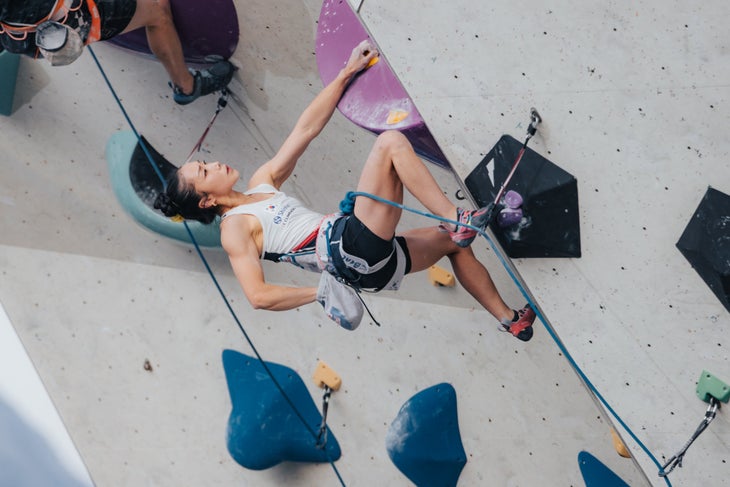
Yet, it was not just the back-and-forth of World Cup results that kept fans on the edge of their seats from one event to the next. It was that the climbing styles of Markovič and Kim contrasted marvelously; Kim was the slow and methodical prodigy, and Markovič was the slightly older powerhouse. Fittingly, the rivalry wound down in early 2015, right as another climber—Janja Garnbret—started her rise to the throne. But an entire documentary could be made about the multi-season battle between Mina Markovič and Jain Kim, which—to my mind anyway— remains the gold standard for comp climbing rivalries.
View this post on Instagram
Markovič took first in the 2015 Lead World Cup Overall—with Kim a close second.
The post The 7 Greatest Comp Climbing Rivalries of All Time appeared first on Climbing.

